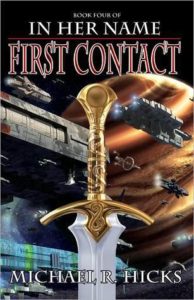Book Review: First Contact by Michael R. Hicks
The scout ship Aurora is searching for new worlds, especially inhabitable ones for the citizens of Earth and the various worlds their descendants have colonized. What at first seems like a bonus of two viable worlds in the same star system turns into a deadly encounter. Those worlds are inhabited by members of an alien race that will come to be known as the Kreelan Empire. And now that the Kreelans are aware humans exist, they are very excited about going to war with us. All of us.
This is the first book in the In Her Name trilogy of trilogies, though the middle trilogy was written first. It details how the Human-Kreelan War got started. The series is a cross between military SF and full-on space opera, though this volume tends more towards the former.
It seems that the Kreelans are what TV Tropes call a “Planet of Hats”, a society that is entirely based around one concept or activity for the purposes of moving the plot along. In this case, their “hat” is honorable battle; Kreelans want to fight, preferably hand-to-hand, and the humans are the first new opponents they’ve had in millennia. In order to ensure that they aren’t going to accidentally wipe out the humans before the war can really get started, the Kreelans actually go back to their history books and recreate weapons and vehicles of roughly the same technological level as the humans have now.
Early in the first chapter, we are told that most of the characters we’re meeting are not going to make it through the next few hours. This makes it a bit of a slog as various crew members’ backgrounds and personality quirks are revealed, often during a combat scene. The Kreelans are choosing a Messenger to send back to human space and get the squishy people ready to fight. Once they have that sole survivor, the focus shifts to Earth and the other human worlds’ reaction to the news, and finally to the defense of the first planet on the invasion list.
Many of the people in the book seem to come straight out of Central Casting; the eccentric but brilliant general, the sassy lady reporter, the bungling officer who dies to let a real hero take command, etc. This is exacerbated by many stereotypes of Earth cultures spreading to their colonies. For example, people from the Francophone colonies are all some variant of French stereotypes, right down to having their best troops being the Foreign Legion. One of the heroes comes from the planet of Nagoya, which is basically the Japanese city of Nagoya, but a whole planet of it. The only mitigating factor is that the casting is a bit more diverse than it would have been in the Twentieth Century.
This means that many of the best passages in the book are those told from the perspective of the Kreelan Empire, which has the advantage of being alien enough to engage the author’s creativity.
There are quite a few exciting combat scenes, and one of the things I like is that the story does not shy away from showing that even the “good guys” can be forced into taking civilian lives as collateral damage. (The Kreelans have no real concept of “civilian”, seeing them more as “targets that don’t fight back and thus only worthy of extermination.”)
One weakness of this being in the military SF subgenre is that the book has a tendency to make the Kreelans “right”–the only humans of consequence are those that engage in combat or provide support for those that do. I’d like to see the human tendency to do things that aren’t somehow related to combat or survival as a strength that the Kreelans have discarded in their single-minded pursuit of battle.
Briefly discussed in this book, and apparently a major factor at the beginning of the next one, is that the Kreelan warriors are all female. Due to a “curse” their males are non-sentient, and mating is only semi-consensual. Easily triggered readers might want to give that a miss.
Otherwise, this is a pretty clear-cut “no shades of grey” war story where you can root for the human heroes. Not the best military SF, but readable.


